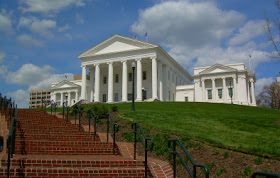- - - - - - - - - - - - - -
A minor tempest is brewing in the Virginia attorney general's race. Two candidates for the Republican nomination for that office have attacked the Virginia Lottery. State Sen. Mark Earley of Chesapeake complains there ``is too much state-sponsored gambling'' while former Public Safety Secretary Jerry Kilgore proposes that if lottery proceeds are not returned to local governments, then voters should have an opportunity to repeal the lottery's authorization.
 |
| Virginia State Capitol, Richmond |
While Stolle and Davis seem to be looking at the lottery from a pragmatic perspective, all of the candidates seem to be missing the larger point: When compared to taxes, a lottery is a morally superior means to raise money for government programs.
The reason for this moral superiority can be explained simply. Taxes are always obtained through coercion (the threat of punishment for nonpayment) while lottery proceeds are obtained from voluntary action (an individual willingly purchases a lottery ticket). Acts that are coerced are always morally inferior to those that are done voluntarily.
As Robert Ringer wrote in his 1979 book, Restoring the American Dream, ``It is instructive to note that, among the many dictionary definitions, a `tax' is described as: `a heavy demand'; `a burden'; `a compulsory payment of a percentage of income . . . for the support of a government.''' Ringer adds: If something is compulsory, it means you are forced to do it. And the use of force is . . . the act of aggressing on a person's rights.'' Thus he concludes: ``No matter how much good certain people may believe is accomplished with `tax' money, the good can never negate the immorality of theft. You cannot change the nature of stealing by calling it taxation and explaining that it is a patriotic means of `raising revenue.'''
There is also a pragmatic case against taxes, made succinctly by the Cato Institute's David Boaz in his 1997 book, Libertarianism: A Primer:
``Now let's consider an ever-popular form of coercion by which governments extract money directly from those who earn it: taxation. Taxes reduce the return each individual gets from economic activity. Since one of the important functions of income - including profits and losses - is to direct resources toward their most highly valued uses, an artificial reduction in the return has a distorting effect on economic calculation. . . . Taxes always have different effects on different economic actors. They drive the marginal supplier or the marginal purchaser out of the market. . . . High taxes discourage work effort. Why work overtime if the government will take half of what you earn? Why invest in a risky business opportunity when the government promises to take half of any profit but to let you bear the losses? In all these ways, taxes reduce the productive effort directed toward serving human needs.''
A lottery is preferable to coercive taxation because compulsory actions eliminate the possibility of virtuous behavior: Virtue is only possible as the result of free will. The 19th century German philosopher Karl Wilhelm Von Humboldt explained it this way: ``Coercion may prevent many transgressions; but it robs even actions which are legal of a part of their beauty. Freedom may lead to many transgressions, but it lends even to vices a less ignoble form.''
Opponents of the lottery argue that gambling is itself an ignoble act. Yet buying a lottery ticket is always and everywhere a free choice. No one holds a gun to your head to force you to buy a ticket, and no one will throw you in jail if you refuse to buy one.
Other opponents argue that the lottery is more tempting, and therefore more burdensome, to the poor, who buy more tickets as a proportion of their income than wealthy people do. This is patronizing and ultimately insulting, for the essence of the argument is that poor people are not smart enough, or prudent enough, to decide for themselves how to spend their own money, but ``we who know better'' can decide for them.
A strong pragmatic and moral case can be made for reducing taxes and expanding the lottery and other voluntary means to raise government revenue (such as increasing user fees paid by those who actually benefit from government services).
Our attorney general candidates should be on notice: Rather than eliminate the lottery, a morally superior form of raising government revenues through voluntary (rather then coercive) means, we should expand it.
Memo: Richard Sincere Jr. is state coordinator for the Republican Liberty Caucus of Virginia.
No comments:
Post a Comment